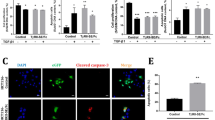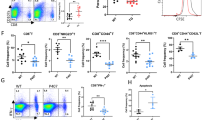Abstract
Transforming growth factor beta (TGF-β) promotes tumor growth, invasion and metastasis in established tumors. In this study, we analyzed the effect of overexpressing an anti-TGF-β peptide fused to apolipoprotein A-I (ApoA-I) as a scaffold molecule. We generated and characterized stable MC38 colon carcinoma clones expressing ApoA-I fused to the anti-TGF-β peptide P144 and ApoA-I as control cells. We evaluated in vitro the gene expression profile, cell cycle and anchorage-independent growth. The in vivo tumorigenic potential and immunogenicity were analyzed inoculating the MC38 clones into C57BL/6 mice, recombination-activating gene 1 knockout mice or mice deficient in NK cells either subcutaneously or intrasplenically to generate hepatic metastases. While overexpression of ApoA-I had no effect on the parameters analyzed, ApoA-I fused to P144 markedly diminished the tumorigenic capacity and metastatic potential of MC38 in vitro and in vivo, thus generating a highly immunogenic cell line. MC38 cells transfected with ApoA-I fused to P144 triggered memory T cell responses able to eliminate the parental cell line upon re-challenge. In summary, expression of ApoA-I fused to P144 is a novel strategy to modulate TGF-β in tumor cells. These results highlight the potential of TGF-β as a target in the development of new antitumor treatments.





Similar content being viewed by others
Abbreviations
- ApoA-I:
-
Apolipoprotein A-I
- ApoLinkerP144:
-
Fusion protein of apolipoprotein A-I and P144
- Cox2 :
-
Cyclooxygenase 2
- FC:
-
Fold change
- Foxo3a :
-
Forkhead box O3
- HDL:
-
High-density lipoproteins
- H3f3a :
-
Histone H3.3
- MC38 Apo:
-
MC38 stable clones overexpressing apolipoprotein A-I
- MC38 ApoLinkerP144:
-
MC38 stable clones overexpressing the fusion protein of apolipoprotein A-I and P144
- Mmp2 :
-
Matrix metallopeptidase 2
- Mmp9 :
-
Matrix metallopeptidase 9
- Rag-1 :
-
Recombination-activating gene 1
- SR-B1:
-
Scavenger receptor class B type I
- Tlr4 :
-
Toll-like receptor 4
- TGF-β:
-
Transforming growth factor beta
References
Massague J (2008) TGFbeta in cancer. Cell 134:215–230
Flavell RA, Sanjabi S, Wrzesinski SH, Licona-Limon P (2010) The polarization of immune cells in the tumour environment by TGFbeta. Nat Rev Immunol 10:554–567
Bacman D, Merkel S, Croner R, Papadopoulos T, Brueckl W, Dimmler A (2007) TGF-beta receptor 2 downregulation in tumour-associated stroma worsens prognosis and high-grade tumours show more tumour-associated macrophages and lower TGF-beta1 expression in colon carcinoma: a retrospective study. BMC Cancer 7:156
Bruna A, Darken RS, Rojo F, Ocana A, Penuelas S, Arias A, Paris R, Tortosa A, Mora J, Baselga J, Seoane J (2007) High TGFbeta-Smad activity confers poor prognosis in glioma patients and promotes cell proliferation depending on the methylation of the PDGF-B gene. Cancer Cell 11:147–160
Ivanovic V, Todorovic-Rakovic N, Demajo M, Neskovic-Konstantinovic Z, Subota V, Ivanisevic-Milovanovic O, Nikolic-Vukosavljevic D (2003) Elevated plasma levels of transforming growth factor-beta 1 (TGF-beta 1) in patients with advanced breast cancer: association with disease progression. Eur J Cancer 39:454–461
Krasagakis K, Tholke D, Farthmann B, Eberle J, Mansmann U, Orfanos CE (1998) Elevated plasma levels of transforming growth factor (TGF)-beta1 and TGF-beta2 in patients with disseminated malignant melanoma. Br J Cancer 77:1492–1494
Robson H, Anderson E, James RD, Schofield PF (1996) Transforming growth factor beta 1 expression in human colorectal tumours: an independent prognostic marker in a subgroup of poor prognosis patients. Br J Cancer 74:753–758
Medina-Echeverz J, Fioravanti J, Diaz-Valdes N, Frank K, Aranda F, Gomar C, Ardaiz N, Dotor J, Umansky V, Prieto J, Berraondo P (2014) Harnessing high density lipoproteins to block transforming growth factor beta and to inhibit the growth of liver tumor metastases. PLoS ONE 9:e96799
Acton S, Rigotti A, Landschulz KT, Xu S, Hobbs HH, Krieger M (1996) Identification of scavenger receptor SR-BI as a high density lipoprotein receptor. Science 271:518–520
Cao WM, Murao K, Imachi H, Yu X, Abe H, Yamauchi A, Niimi M, Miyauchi A, Wong NC, Ishida T (2004) A mutant high-density lipoprotein receptor inhibits proliferation of human breast cancer cells. Cancer Res 64:1515–1521
Liu J, Voutilainen R, Heikkila P, Kahri AI (1997) Ribonucleic acid expression of the CLA-1 gene, a human homolog to mouse high density lipoprotein receptor SR-BI, in human adrenal tumors and cultured adrenal cells. J Clin Endocrinol Metab 82:2522–2527
Jiang J, Nilsson-Ehle P, Xu N (2006) Influence of liver cancer on lipid and lipoprotein metabolism. Lipids Health Dis 5:4
Fioravanti J, Medina-Echeverz J, Berraondo P (2011) Scavenger receptor class B, type I: a promising immunotherapy target. Immunotherapy 3:395–406
Lacko AG, Nair M, Prokai L, McConathy WJ (2007) Prospects and challenges of the development of lipoprotein-based formulations for anti-cancer drugs. Expert Opin Drug Deliv 4:665–675
Lou B, Liao XL, Wu MP, Cheng PF, Yin CY, Fei Z (2005) High-density lipoprotein as a potential carrier for delivery of a lipophilic antitumoral drug into hepatoma cells. World J Gastroenterol 11:954–959
McConathy WJ, Nair MP, Paranjape S, Mooberry L, Lacko AG (2008) Evaluation of synthetic/reconstituted high-density lipoproteins as delivery vehicles for paclitaxel. Anticancer Drugs 19:183–188
Dotor J, Lopez-Vazquez AB, Lasarte JJ, Sarobe P, Garcia-Granero M, Riezu-Boj JI, Martinez A, Feijoo E, Lopez-Sagaseta J, Hermida J, Prieto J, Borras-Cuesta F (2007) Identification of peptide inhibitors of transforming growth factor beta 1 using a phage-displayed peptide library. Cytokine 39:106–115
Ezquerro IJ, Lasarte JJ, Dotor J, Castilla-Cortazar I, Bustos M, Penuelas I, Blanco G, Rodriguez C, Lechuga Mdel C, Greenwel P, Rojkind M, Prieto J, Borras-Cuesta F (2003) A synthetic peptide from transforming growth factor beta type III receptor inhibits liver fibrogenesis in rats with carbon tetrachloride liver injury. Cytokine 22:12–20
Santiago B, Gutierrez-Canas I, Dotor J, Palao G, Lasarte JJ, Ruiz J, Prieto J, Borras-Cuesta F, Pablos JL (2005) Topical application of a peptide inhibitor of transforming growth factor-beta1 ameliorates bleomycin-induced skin fibrosis. J Invest Dermatol 125:450–455
Gil-Guerrero L, Dotor J, Huibregtse IL, Casares N, Lopez-Vazquez AB, Rudilla F et al (2008) In vitro and in vivo down-regulation of regulatory T cell activity with a peptide inhibitor of TGF-beta1. J Immunol 181:126–135
Llopiz D, Dotor J, Casares N, Bezunartea J, Diaz-Valdes N, Ruiz M, Aranda F, Berraondo P, Prieto J, Lasarte JJ, Borras-Cuesta F, Sarobe P (2009) Peptide inhibitors of transforming growth factor-beta enhance the efficacy of antitumor immunotherapy. Int J Cancer 125:2614–2623
Llopiz D, Dotor J, Zabaleta A, Lasarte JJ, Prieto J, Borras-Cuesta F, Sarobe P (2008) Combined immunization with adjuvant molecules poly(I:C) and anti-CD40 plus a tumor antigen has potent prophylactic and therapeutic antitumor effects. Cancer Immunol Immunother 57:19–29
Fioravanti J, Gonzalez I, Medina-Echeverz J, Larrea E, Ardaiz N, Gonzalez-Aseguinolaza G, Prieto J, Berraondo P (2011) Anchoring interferon alpha to apolipoprotein A-I reduces hematological toxicity while enhancing immunostimulatory properties. Hepatology 53:1864–1873
Irizarry RA, Bolstad BM, Collin F, Cope LM, Hobbs B, Speed TP (2003) Summaries of Affymetrix GeneChip probe level data. Nucleic Acids Res 31:e15
Blake JA, Dolan M, Drabkin H, Hill DP, Li N, Sitnikov D et al (2013) Gene Ontology annotations and resources. Nucleic Acids Res 41:D530–D535
Huber W, Carey VJ, Gentleman R, Anders S, Carlson M, Carvalho BS et al (2015) Orchestrating high-throughput genomic analysis with bioconductor. Nat Methods 12:115–121
DiPaola RS (2002) To arrest or not to G(2)-M Cell-cycle arrest : commentary re: A. K. Tyagi et al., Silibinin strongly synergizes human prostate carcinoma DU145 cells to doxorubicin-induced growth inhibition, G(2)-M arrest, and apoptosis. Clin. cancer res., 8: 3512–3519, 2002. Clin Cancer Res 8:3311–3314
Yamazaki T, Hannani D, Poirier-Colame V, Ladoire S, Locher C, Sistigu A, Prada N, Adjemian S, Catani JP, Freudenberg M, Galanos C, Andre F, Kroemer G, Zitvogel L (2014) Defective immunogenic cell death of HMGB1-deficient tumors: compensatory therapy with TLR4 agonists. Cell Death Differ 21:69–78
Ramos-DeSimone N, Hahn-Dantona E, Sipley J, Nagase H, French DL, Quigley JP (1999) Activation of matrix metalloproteinase-9 (MMP-9) via a converging plasmin/stromelysin-1 cascade enhances tumor cell invasion. J Biol Chem 274:13066–13076
Storz P, Doppler H, Copland JA, Simpson KJ, Toker A (2009) FOXO3a promotes tumor cell invasion through the induction of matrix metalloproteinases. Mol Cell Biol 29:4906–4917
Lee HY, Youn SW, Kim JY, Park KW, Hwang CI, Park WY, Oh BH, Park YB, Walsh K, Seo JS, Kim HS (2008) FOXO3a turns the tumor necrosis factor receptor signaling towards apoptosis through reciprocal regulation of c-Jun N-terminal kinase and NF-kappaB. Arterioscler Thromb Vasc Biol 28:112–120
Masferrer JL, Leahy KM, Koki AT, Zweifel BS, Settle SL, Woerner BM, Edwards DA, Flickinger AG, Moore RJ, Seibert K (2000) Antiangiogenic and antitumor activities of cyclooxygenase-2 inhibitors. Cancer Res 60:1306–1311
Nemunaitis J, Barve M, Orr D, Kuhn J, Magee M, Lamont J et al (2014) Summary of bi-shRNA/GM-CSF augmented autologous tumor cell immunotherapy (FANG) in advanced cancer of the liver. Oncology 87:21–29
Liu P, Jaffar J, Zhou Y, Yang Y, Hellstrom I, Hellstrom KE (2009) Inhibition of TGFbeta1 makes nonimmunogenic tumor cells effective for therapeutic vaccination. J Immunother 32:232–239
Shahzad MM, Mangala LS, Han HD, Lu C, Bottsford-Miller J, Nishimura M et al (2011) Targeted delivery of small interfering RNA using reconstituted high-density lipoprotein nanoparticles. Neoplasia 13:309–319
Acknowledgments
We are grateful to Dr. Paul Miller for English editing. This work was supported by the grant PI13/00207 from Instituto de Salud Carlos III, financed by the FEDER program of the European Union. Pedro Berraondo was supported by a Miguel Servet contract from Instituto de Salud Carlos III.
Conflict of interest
The authors declare that there are no conflicts of interest.
Author information
Authors and Affiliations
Corresponding author
Rights and permissions
About this article
Cite this article
Medina-Echeverz, J., Vasquez, M., Gomar, C. et al. Overexpression of apolipoprotein A-I fused to an anti-transforming growth factor beta peptide modulates the tumorigenicity and immunogenicity of mouse colon cancer cells. Cancer Immunol Immunother 64, 717–725 (2015). https://doi.org/10.1007/s00262-015-1681-9
Received:
Accepted:
Published:
Issue Date:
DOI: https://doi.org/10.1007/s00262-015-1681-9




